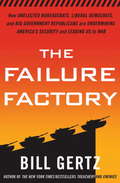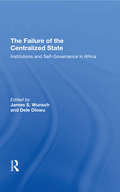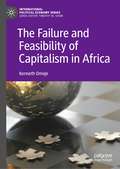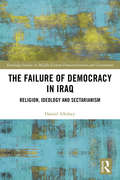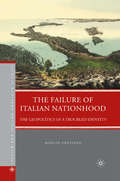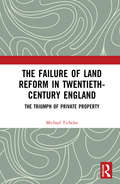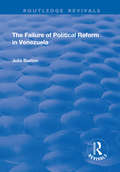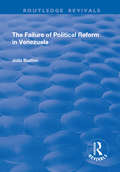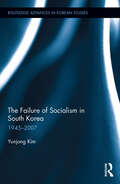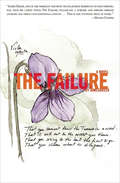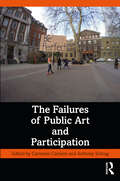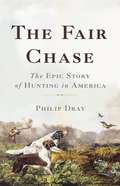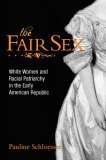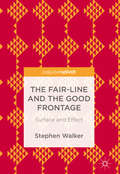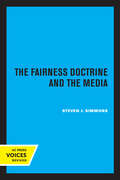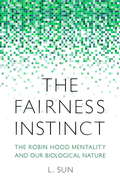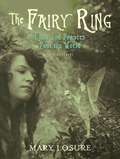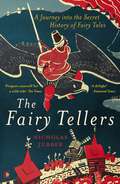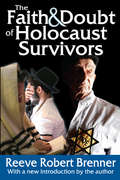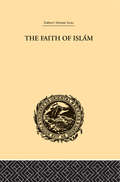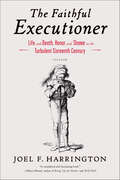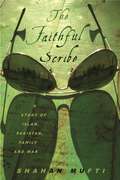- Table View
- List View
The Failure Factory
by Bill GertzThe U. S. government is in crisis. The real power in America has shifted to a vast network of unelected officials whose authority has grown wildly out of control. In his latest blockbuster book, acclaimed defense and national-security reporter Bill Gertz exposes this group of astonishingly powerful leaders–and their enablers in the political class–and its devastating effect on America’s national security. Gertz names names of those who actively subvert official U. S. policy–including not only liberal Democrats but also a number of so-called Republicans who have joined this insidious “Blame America First” crowd. Based on scores of exclusive interviews and displaying the groundbreaking reporting that has made Bill Gertz’s previous books smash bestsellers,The Failure Factoryoffers a chilling look at the threats to our national security that exist within our own government. “Mr. Gertz makes some extremely important points. ” –The Washington Times “The hottest reporter in town . . . [Gertz] breaks dozens of stories every year. ” –The Washington Post
The Failure Of The Centralized State: Institutions And Self-governance In Africa
by John W Harbeson Dele Olowu James Wunsch Vincent OstromThis book is an outcome of the workshop on Political Theory and Policy Analysis, held in Indiana, during the 1985/86. It seeks to explains why the centralized African state has failed and discusses the breakdown of social processes indirectly caused by the policies of the centralized state.
The Failure and Feasibility of Capitalism in Africa (International Political Economy Series)
by Kenneth OmejeThis book argues that capitalism has practically failed to deliver the long-desired economic transformation and inclusive development in postcolonial Africa. The principal factor that accounts for this failure is the prolific non-productive forms of capitalism that tend to be dominant in the African continent and their governance dimensions. The research explores how and why capitalism has failed in the African context and the feasibility of turning it around. The book meets the demands of diverse audiences in the fields of International Political Economy, Development Economics, Political Science, and African Studies. The author adopts an unconventional narrativist approach that makes the book amenable to general readership.
The Failure of Democracy in Iraq: Religion, Ideology and Sectarianism (Routledge Studies in Middle Eastern Democratization and Government)
by Hamid AlkifaeyThe Failure of Democracy in Iraq studies democratization in post-2003 Iraq, which has so far failed, due mainly to cultural and religious reasons. There are other factors, such as the legacy of the dictatorial regime, exclusionary policies, the problem of stateness, interference by regional powers, the rentier economy and sectarianism, that have impeded democracy and contributed to its failure, but the employment of religion in politics was the most to blame. The establishment of stable democratic institutions continues to elude Iraq, 15 years after toppling the dictatorship. The post-2003 Iraq could not completely eradicate the long historical tradition of despotic governance due to deep-seated religious beliefs and tribal values, along with widening societal ethno-sectarian rifts which precluded the negotiation of firm and stable elite settlements and pacts across communal lines. The book examines how the fear in neighbouring countries of a region-wide domino effect of the Iraq democratization process caused them to adopt interventionist policies towards Iraq that helped to stunt the development of democracy. The lack of commitment by the initiator of the democratic process, the United States, undermined the prospects of democratic consolidation. This is compounded by serious mistakes such as de-Ba’athification and the disbanding of the Iraqi army and security apparatuses which caused a security vacuum the US forces were not able to fill. The Failure of Democracy in Iraq is a key resource for all students and academics interested in democracy, Islam and Middle East Studies.
The Failure of Italian Nationhood
by Manlio GrazianoThis book provides a political, economic, sociological, and cultural history of Italy that looks at its difficulties with the task of nation-building.
The Failure of Land Reform in Twentieth-Century England: The Triumph of Private Property
by Michael TichelarBased on a mixture of primary historical research and secondary sources, this book explores the reasons for the failure of the state in England during the twentieth century to regulate, tax, and control the market in land for the common or public good. It is maintained that this created the circumstances in which private property relationships had triumphed by the end of the century. Explaining a complex field of legislation and policy in accessible terms, the book concludes by asking what type of land reform might be relevant in the twenty-first century to address the current housing crisis, which seen in its widest context, has become the new land question of the modern era.
The Failure of Political Reform in Venezuela (Routledge Revivals Ser.)
by Julia BuxtonThis title was first published in 2001. The victory of former lieutenant colonel Hugo Chavez in the Venezuelan presidential elections of 1998 was criticized as a blow against the country's deep-seated democratic tradition. It is claimed that this simplistic argument fails to recognize the extent of democratic deterioration in the country and the limitations imposed by discredited political actors on a meaningful democratic reform process. The book aims to break new ground in providing unseen evidence of electoral fraud and offers a fresh perspective on the nature of democratic development.
The Failure of Political Reform in Venezuela (Routledge Revivals)
by Julia BuxtonThis title was first published in 2001.The victory of former lieutenant colonel Hugo Chavez in the Venezuelan presidential elections of 1998 was criticized as a blow against the country's deep-seated democratic tradition. It is claimed that this simplistic argument fails to recognize the extent of democratic deterioration in the country and the limitations imposed by discredited political actors on a meaningful democratic reform process. The book aims to break new ground in providing unseen evidence of electoral fraud and offers a fresh perspective on the nature of democratic development.
The Failure of Socialism in South Korea: 1945-2007 (Routledge Advances in Korean Studies)
by Yunjong KimDespite the fact that socialist parties have proved to be a major political force across the world, this has not been the case in Asian countries. Socialism in South Korea is a quintessential example of this failure. Despite the existence of a socialist party and what would seem to be the right conditions for development, the Korean socialist tendency has failed to become a meaningful force in politics. This book explores why and under what conditions Korean socialism has failed to develop into a social democrat movement in the post-war period. Within the context of the integration of structural and agency factors, it goes beyond the generally accepted view that the left failed because of suppression by the state and proffers that the real reason why socialism failed lay with its inability to develop beyond revolutionary socialism and build a more pragmatic social democracy that could develop a broad alliance within Korean society. Also drawing on examples from Western Europe and Latin America, where left-wing forces have achieved power, this book will be of huge interest not only to students and scholars of Asian and Korean politics, but also socialism, comparative and international politics alike.
The Failure: A Novel
by James GreerThe Failure is a picaresque novel set in Los Angeles about two guys who conceive and badly execute a plan to rob a Korean check-cashing store in order to finance the prototype for an impossibly ridiculous Internet application."James Greer, one of the nimblest and most multilayered American fiction writers, has, with his latest novel The Failure, pulled off a sublime and shivery-smooth literary hat-trick-cum-emotional-gotcha. I defy anyone to come up with an equation to explain how this book's first impression as a ridiculously clever, funny crime story can gradually disclose a metanovel built from far more encyclopedic scratch only to reveal upon its conclusion a central, overriding thought so heartfelt literally it trembles your lower lip. This is one stunning piece of work." --Dennis Cooper, author of Ugly Man"James Greer's The Failure is such an unqualified success, both in conception and execution, that I have grave doubts he actually wrote it." --Steven SoderberghJames Greer is the author of the novel Artificial Light (Akashic Books), which won a California Book Award for Best Debut Novel, and the nonfiction book Guided By Voices: A Brief History (Grove Press), a biography of the band for which he once played bass guitar. He is currently working with director Steven Soderbergh on a rock musical about Cleopatra starring Catherine Zeta-Jones. He lives in Los Angeles.
The Failures of Public Art and Participation
by Cameron Cartiere Anthony SchragThis collection of original essays takes a multi-disciplinary approach to explore the theme of failure through the broad spectrum of public art and social practice. The anthology brings together practicing artists, curators, activists, art writers, administrators, planners, and educators from around the world to offer differing perspectives on the many facets of failure in commissioning, planning, producing, evaluating, and engaging communities in the continually evolving field of art in the public realm. As such, this book offers a survey of currently unexplored and interconnected thinking, and provides a much-needed critical voice to the commissioning of public and participatory arts. The volume includes case studies from the UK, the US, China, Cuba, and Denmark, as well as discussions of digital public art collections. The Failures of Public Art and Participation will be of interest for students and scholars of visual arts, design and architecture interested in how art in the public realm fits within social and political contexts.
The Fair Chase: The Epic Story of Hunting in America
by Philip DrayAn award-winning historian tells the story of hunting in America, showing how this sport has shaped our national identity.From Daniel Boone to Teddy Roosevelt, hunting is one of America's most sacred-but also most fraught-traditions. It was promoted in the 19th century as a way to reconnect "soft" urban Americans with nature and to the legacy of the country's pathfinding heroes. Fair chase, a hunting code of ethics emphasizing fairness, rugged independence, and restraint towards wildlife, emerged as a worldview and gave birth to the conservation movement. But the sport's popularity also caused class, ethnic, and racial divisions, and stirred debate about the treatment of Native Americans and the role of hunting in preparing young men for war. This sweeping and balanced book offers a definitive account of hunting in America. It is essential reading for anyone interested in the evolution of our nation's foundational myths.
The Fair Reader: An Extra! Review Of Press And Politics In The '90s
by Jim Naureckas Janine JacksonWhy did major news outlets virtually ignore the only cost-effective plan for universal health care coverage—even though polls showed the plan had majority support? Why did leading journalists go out of their way to attack Bill Clinton’s rivals in the 1992 Democratic primary—while focusing unprecedented attention on Clinton’s personal life? Why do establishment media consider falling unemployment to be bad news? In the tradition of I.F. Stone and George Seldes, the contributors to The FAIR Reader probe the often mysterious connections between press and politics in the 1990s. The essays are filled with startling information about the critical issues of our time—from the Gulf War and the Clarence Thomas hearings to the debates over health care reform and NAFTA—documenting the deceptive, one-sided mainstream reporting that leaves the public in the dark. Particular attention is paid to the election of 1992 and the Clinton administration, showing how the media promoted, undercut, and finally shaped Clinton to fit a media agenda, the book demonstrates that systematic media bias poses a threat to the democratic process and the free flow of information to the U.S. citizenry. FAIR, founded in 1986, is the national media watch group dedicated to the principle that independent, aggressive, and critical media are essential to an informed democracy. In the nine years since FAIR was launched, it has gained national recognition for its well-documented studies of media bias, its challenge to powerful media figures like Rush Limbaugh, and its award-winning journal of media criticism and politics, Extra!. The FAIR Reader collects Extra!’s most incisive reporting on journalism and politics in the ‘90s. It will be invaluable to anyone interested in decoding the media agenda behind the daily news.
The Fair Sex: White Women and Racial Patriarchy in the Early American Republic
by Pauline E. SchloesserChoice Outstanding Academic Title 2002 Once the egalitarian passions of the American Revolution had dimmed, the new nation settled into a conservative period that saw the legal and social subordination of women and non-white men. Among the Founders who brought the fledgling government into being were those who sought to establish order through the reconstruction of racial and gender hierarchies. In this effort they enlisted “the fair sex,”&#—white women. Politicians, ministers, writers, husbands, fathers and brothers entreated Anglo-American women to assume responsibility for the nation's virtue. Thus, although disfranchised, they served an important national function, that of civilizing non-citizen. They were encouraged to consider themselves the moral and intellectual superiors to non-whites, unruly men, and children. These white women were empowered by race and ethnicity, and class, but limited by gender. And in seeking to maintain their advantages, they helped perpetuate the system of racial domination by refusing to support the liberation of others from literal slavery. Schloesser examines the lives and writings of three female political intellectuals—;Mercy Otis Warren, Abigail Smith Adams, and Judith Sargent Murray—;each of whom was acutely aware of their tenuous position in the founding era of the republic. Carefully negotiating the gender and racial hierarchies of the nation, they at varying times asserted their rights and demurred to male governance. In their public and private actions they represented the paradigm of racial patriarchy at its most complex and its most conflicted.
The Fair-Line and the Good Frontage: Surface And Effect
by Stephen WalkerThis book offers an extended consideration of the fairground showfront. It combines archival material, contemporary examples of fairs, and a sustained theoretical engagement with influential philosophies of surface, including recent work by Avrum Stroll and Andrew Benjamin, as well as the nineteenth century author Gottfried Semper. Semper’s work on the origin of architectural enclosure —formed from woven mats and carpets— anticipates the surface and material history of the showfront. Initial chapters introduce these philosophies, the evolution of showfronts, and the ways in which individual fairground rides and attractions are arranged to form an enclosing boundary for the whole fair. Later chapters focus on issues of spectacle and illusion, vast ‘interior’ spaces, atmosphere, crowds and surface effects. Informed by a wide range of work from other design and cultural studies, the book will be of interest to readers in these areas, as well as architecture and those curious about the fairground.
The Fairness Doctrine and the Media
by Steven J. SimmonsThis title is part of UC Press's Voices Revived program, which commemorates University of California Press’s mission to seek out and cultivate the brightest minds and give them voice, reach, and impact. Drawing on a backlist dating to 1893, Voices Revived makes high-quality, peer-reviewed scholarship accessible once again using print-on-demand technology. This title was originally published in 1978.
The Fairness Instinct
by L. SunCombining research from the social sciences, hard sciences, and the humanities, this accessible cross-disciplinary book offers fascinating insights into a key component of human nature and society. Biologist L. Sun examines the innate sense of fairness displayed by human beings in all kinds of societies throughout history. He argues persuasively that it is an emotion and behavior rooted in our DNA, rather than a product of ideology or convention. Citing animal studies that show that even monkeys react negatively to patently unfair treatment, Sun delves into the issue of why this instinct may have evolved with a new biological framework. Specifically, he identifies two selective forces behind the evolution of fairness. One is the need for resolving conflicts of interest in social groups, and the other is a bottom-up drive pushing toward equality in resource sharing in the hierarchies of society. Turning to the down side of the fairness instinct, the author shows that when it plays too great a role in leveling inequalities, it can have negative repercussions, such as a society where outstanding achievers arouse envy and only mediocrity is condoned. Even worse is the vicious cycle of spite resulting from an injured sense of fairness, which can easily spill over into violence. Finally, the author considers the role that fairness plays in religion with its promise to ultimately overcome the prejudices and inequality of human society by offering the hope of divine justice.
The Fairy Ring: Or Elsie and Frances Fool the World
by Mary LosureMary Losure presents this enthralling true story as a fanciful narrative featuring the original Cottingley fairy photos and previously unpublished drawings and images from the family's archives. A delight for everyone with a fondness for fairies, and for anyone who has ever started something that spun out of control.
The Fairy Tellers: A Journey into the Secret History of Fairy Tales
by Nicholas Jubber'Like a child after the Pied Piper I pursued Jubber into a world both human and full of magic. A carnival of a book, rigorously researched and jostling with life' Amy Jeffs, author of Storyland: A New Mythology of Britain'Magical tales about magical tales and tellers. Jubber, congenially and fascinatingly, explores the land from which the great fairy stories seeped, making the stories more resonant, powerful and important than ever' Charles Foster, author of Being a Human and Being a BeastWho were the Fairy Tellers?In this far-ranging quest, award-winning author Nicholas Jubber unearths the lives of the dreamers who made our most beloved fairy tales: inventors, thieves, rebels and forgotten geniuses who gave us classic tales such as 'Cinderella', 'Hansel and Gretel', 'Beauty and the Beast' and 'Baba Yaga'.From the Middle Ages to the birth of modern children's literature, they include a German apothecary's daughter, a Syrian youth running away from a career in the souk and a Russian dissident embroiled in a plot to kill the tsar.Following these and other unlikely protagonists, we travel from the steaming cities of Italy and the Levant, under the dark branches of the Black Forest, deep into the tundra of Siberia and across the snowy fells of Lapland. In the process, we discover a fresh perspective on some of our most frequently told stories. Filled with adventure, tragedy and real-world magic, this bewitching book uncovers the stranger lives behind the strangest of tales.
The Faith and Doubt of Holocaust Survivors
by Reeve Robert BrennerThe Faith and Doubt of Holocaust Survivors reveals the victims' frank and thought-provoking answers to searching questions about their experiences: Was the Holocaust God's will? Was there any meaning or purpose in the Holocaust? Was Israel worth the price six million had to pay? Did the experience in the death camps bring about an avowal of faith? A denial of God? A reaffirmation of religious belief? Did the Holocaust change beliefs about the coming of the Messiah, the Torah, the Jews as the chosen people, and the nature of God?Drawing on the responses of seven hundred survivors, Reeve Robert Brenner reveals the changes, rejections, reaffirmations, doubts, and despairs that have so profoundly affected the faith, practices, ideas, and attitudes of survivors, and, by extension, the entire Jewish people.Many survivors carried their deepest secrets and innermost beliefs silently, from internment to interment. But Brenner's quest provided the impetus for many survivors to end their silence about the past and come forth with their feelings. In poignant vignettes scattered throughout the book, their answers to these profound questions are offered, disclosing ardent, overpowering passions and sensibilities.
The Faith of Islam
by Edward SellFirst Published in 2000. This title is Volume 3 in the 8-volume series titled Islam, one of the Trüber's Oriental Series. This edition is the result of another fifteen years' study of Islam, and of further intercourse with Musalmans. It deals with certain phases of modern Muslim thought in India and in Persia which found no place in the first edition. The result is that a considerable amount of fresh matter has been added, though the general form of the book has not been altered. All who are engaged in this enterprise will find help in this volume - it may also throw light on the political questions of the day.
The Faithful Executioner: Life and Death, Honor and Shame in the Turbulent Sixteenth Century
by Joel F. HarringtonThe extraordinary story of a renaissance-era executioner and his world, based on a rare and overlooked journal.In a dusty German bookshop, the noted historian Joel F. Harrington stumbled upon a remarkable document: the journal of a sixteenth-century executioner. The journal gave an account of the 394 people Meister Frantz Schmidt executed, and the hundreds more he tortured, flogged, or disfigured for more than forty-five years in the city of Nuremberg. But the portrait of Schmidt that gradually emerged was not that of a monster. Could a man who practiced such cruelty also be insightful, compassionate—even progressive?In The Faithful Executioner, Harrington teases out the hidden meanings and drama of Schmidt’s journal. Deemed an official outcast, Meister Frantz sought to prove himself worthy of honor and free his children from the stigma of his profession. Harrington uncovers details of Schmidt’s life and work: the shocking, but often familiar, crimes of the day; the medical practice that he felt was his true calling; and his lifelong struggle to reconcile his craft with his religious faith.In this groundbreaking and intimate portrait, Harrington shows us that our thinking about justice and punishment, and our sense of our own humanity, are not so remote from the world of The Faithful Executioner.
The Faithful Scribe: A Story of Islam, Pakistan, Family, and War
by Shahan MuftiA journalist explores his family's history to reveal the hybrid cultural and political landscape of Pakistan, the world's first Islamic democracy Shahan Mufti's family history, which he can trace back fourteen hundred years to the inner circle of the prophet Muhammad, offers an enlightened perspective on the mystifying history of Pakistan. Mufti uses the stories of his ancestors, many of whom served as judges and jurists in Muslim sharia courts of South Asia for many centuries, to reveal the deepest roots--real and imagined--of Islamic civilization in Pakistan. More than a personal history, The Faithful Scribe captures the larger story of the world's first Islamic democracy, and explains how the state that once promised to bridge Islam and the West is now threatening to crumble under historical and political pressure, and why Pakistan's destiny matters to us all.
The Faithful: A History of Catholics in America
by James M. O'TooleShaken by the ongoing clergy sexual abuse scandal, and challenged from within by social and theological division, Catholics in America are at a crossroads. But is today’s situation unique? And where will Catholicism go from here? With the belief that we understand our present by studying our past, James O’Toole offers a bold and panoramic history of the American Catholic laity. O’Toole tells the story of this ancient church from the perspective of ordinary Americans, the lay believers who have kept their faith despite persecution from without and clergy abuse from within. It is an epic tale, from the first settlements of Catholics in the colonies to the turmoil of the scandal-ridden present, and through the church’s many American incarnations in between. We see Catholics’ complex relationship to Rome and to their own American nation. O’Toole brings to life both the grand sweep of institutional change and the daily practice that sustained believers. The Faithful pays particular attention to the intricacies of prayer and ritual—the ways men and women have found to express their faith as Catholics over the centuries. With an intimate knowledge of the dilemmas and hopes of today’s church, O’Toole presents a new vision and offers a glimpse into the possible future of the church and its parishioners. Moving past the pulpit and into the pews, The Faithful is an unmatched look at the American Catholic laity. Today’s Catholics will find much to educate and inspire them in these pages, and non-Catholics will gain a newfound understanding of their religious brethren.
The Falashas: A Short History of the Ethiopian Jews
by David F. KesslerThis third, revised edition comprises the whole of the original volume and is enhanced by the addition of a new preface and afterward which seek to reply to criticisms of the authors argument about the origins of the Falashas, and include some new thinking on the subject. Drawing on tradition and legend to reinforce his argument, the author again traces the source of the community to the Jewish settlements which existed in ancient Egypt (particularly at Elephantine on the Nile) and in the ancient Meroitic Kingdom, in present day Sudan known in the Bible as Cush.The story told in this book is remarkable, heroic and stimulating and makes a valuable contribution to our understanding of the history of the horn of Africa.
